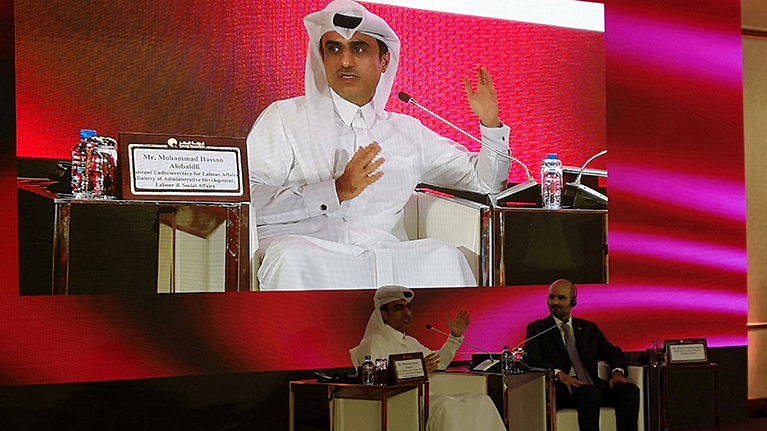Challenges and opportunities of Qatar labour law reform discussed
Benefits and challenges of reforms highlighted at conference

Challenges to adapt to the new regulatory environment and innovative private sector initiatives were discussed by 300 participants at an event organized on 17-18 October 2018 by the Qatar Chamber of Commerce and Industry and the Ministry of Administrative Development, Labour and Social Affairs (ADLSA), in cooperation with the International Labour Organization (ILO) and the Institute for Human Rights and Business (IHRB).
The conference heard that companies committed to respect national law, implement international good practices of fair recruitment and guarantee the free movement of workers will struggle to compete unless there are harmonized standards across projects and sectors which are efficiently enforced.
The need to stimulate demand from the private sector for fair recruitment services from private and public employment agencies and to create an environment that incentivizes companies that take the additional steps to recruit fairly were highlighted as essential to drive change.
Speaking at the event, Henriette McCool, Social Innovation Manager at Vinci said, “Without engaging with the business community, we are not going to reach a level playing field where responsible companies are rewarded commercially. It’s extremely important that all companies support the new labour law reforms and the principles of fair recruitment and workers’ welfare in their operations.”
Recent labour law reforms in Qatar include the establishment of a temporary minimum wage, the creation of five workers dispute settlement committees, the adoption in 2018 of two new laws suppressing the requirement of exit permits for most workers in the country as well as the establishment of a worker’s support and insurance fund.
H.E. Yousef bin Mohammed Al Othman Fakhro, the Minister of Administrative Development, Labour and Social Affairs1 highlighted the government’s commitment to continue along its reform path, “Qatar has taken many steps to guarantee a strong labour market. These reforms will ensure the protection of workers while also benefiting the local economy and businesses. The Government cooperates with the employers in developing, raising awareness and implementing the new legislation.”
Over the two days a wide range of speakers discussed the recent amendments to the Qatar Labour Law as well as promising Qatari and international private-sector initiatives to foster fair recruitment and increase labour market mobility.
Matthias Thorns, Director of Stakeholder Engagement of the International Organization of Employers said, “This event has helped raise awareness about the possibilities, standards and business case for fair recruitment. Companies need to be aware about expectations of international stakeholders when it comes to fair recruitment so they know what they have to do and where they can get help.”
Meanwhile, responding to concerns that employers may lose out from increased labour mobility in Qatar due to the high recruitment fees they often pay, Fahad Zainal, Chief Administration Officer at Qatar Financial Center stressed that, “Freedom of movement between employers is a healthy process. The statistics of the Qatar Financial Center show that the number of workers remaining with the organization, under our free labour market standards, is very high.”
Promising initiatives in several sectors were discussed. The Supreme Committee for Delivery and Legacy which is building infrastructure for the 2022 World Cup highlighted various steps taken to ensure contractors reimburse recruitment fees, which workers often pay through their migration journey, and relieve them from the debts they have incurred to pay those fees. Participants from the hospitality and garment sectors also shared their experiences on the implementation of fair recruitment pilots which had positive impacts on both workers and employers and which should be replicated.
Houtan Homayounpour, Head of the ILO Project Office for the State of Qatar said, “This was the first major collaboration between the ILO Project Office, the Qatar Chamber of Commerce and ADLSA. It helped us better understand the challenges faced by businesses so that we can upscale our collaboration, take on board their recommendations, and help them navigate the labour reform process for the benefit of all.”
For more information about ILO’s activities on fair recruitment and employment in Qatar, please contact Alix Nasri, at nasri@ilo.org
1. At the time of the event H.E. Yousef bin Mohammed Al Othman Fakhro was Undersecretary of Administrative Development, Labour and Social Affairs. He was appointed minister on 4 November 2018.